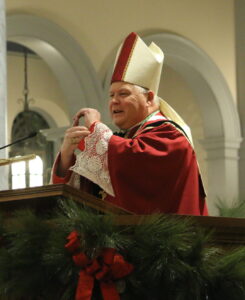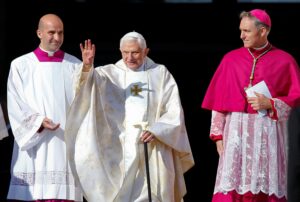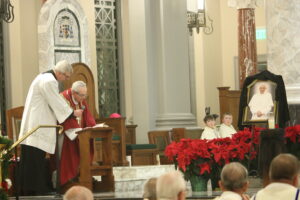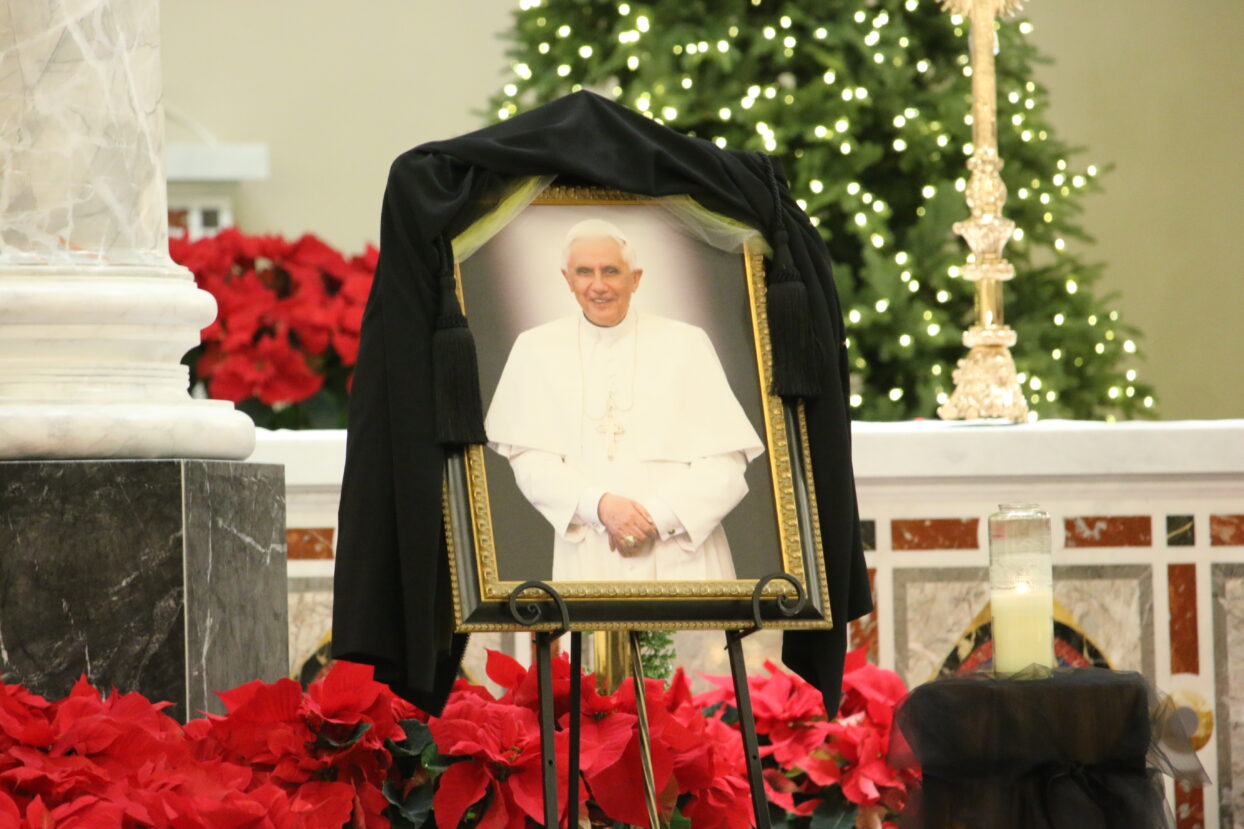Cardinal Rigali, who knew Benedict for years, concelebrated cathedral service
By Dan McWilliams
Bishop Richard F. Stika celebrated a memorial Mass for Pope Benedict XVI on Jan. 4, the day before the Holy Father was laid to rest at the Vatican after he passed away on Dec. 31.
Cardinal Justin Rigali concelebrated the Mass at the Cathedral of the Most Sacred Heart of Jesus and shared a reflection on his friend Pope Benedict. Also concelebrating were cathedral associate pastor Father Martin Gladysz, Father Peter Iorio, and Father Michael Hendershott. Deacon Sean Smith was deacon of the Word, and Deacon Fredy Vargas was deacon of the altar. In all, more than 12 priests and 12 deacons took part in the Mass, and many women religious attended.
“We join tonight and this week with people throughout the world, in big parishes and little parishes, in monasteries and convents, in any place where Mass will be celebrated, remembering Joseph Ratzinger, Pope Benedict XVI, a man who only wanted to teach at the university level,” Bishop Stika said in his opening remarks. “So, we pray for the repose of his soul [and remembering] all his moments of kindness as he shepherded the Church for nearly eight years and as a priest for over 70 years, that he might be received into the presence of God.”
Bishop Stika was the homilist at the Mass for the pope who appointed him bishop of Knoxville in January 2009.
“Actually, I probably shouldn’t be preaching today, for I knew of Benedict. He named me bishop of Knoxville, but the one who really should be preaching is Cardinal Rigali, who called him friend for many years,” Bishop Stika said.
The bishop recalled how the future Pope Benedict had humble plans for his life but that God had other ideas.

Bishop Richard F. Stika leads the memorial Mass for Pope Benedict XVI at the Cathedral of the Most Sacred Heart of Jesus on Jan. 4 following the Dec. 31 death of the pope.
“His name was Joseph Aloisius Ratzinger, born in April of 1927. His father was a police officer, and his mother was a housewife. He had a sister, who never married but actually took care of the cardinal all through his life until she died of cancer. He had a brother who was a priest, Georg, who was a concertmaster in Germany, and the two of them were ordained priests together in 1951,” Bishop Stika said. “All he wanted to do was to be a teacher, a professor, in Germany. But as I’ve often said, if you want to make God laugh, tell Him what your plans are for the rest of your life. At one point, he was named the archbishop of Munich.
“He was one of the last cardinals to be made a cardinal by St. Paul VI. Paul VI interrupted his life, because he wanted to be a professor, and he became an archbishop, and John Paul interrupted his life—he called him to Rome to be the chief theologian of the Church for many, many, many years. At one point, when he turned 70, he had enough of being the chief theologian of the Church, so he wanted to retire, but not really retire—he wanted to be the Vatican librarian. Just imagine all those books and archives. And John Paul said, ‘No, I need you, my brother Joseph.’”
Pope Benedict’s journey through the life of the Church before he became Holy Father continued, and he earned “nicknames that were not really complimentary” such as “The German Shepherd” and “The Rottweiler,” Bishop Stika said.
“He had a very difficult job in trying to guide the Church into the next days,” the bishop said. “In his role, he was one of the foremost advocates of how to deal with the sexual abuse of minors by priests, instituted all kinds of new rules and regulations. And then the great saintly John Paul died, and Benedict gave a wonderful homily at John Paul’s funeral in St. Peter’s Square on that windy day when the Gospel book, even the pages, flipped over until it closed at the end of Mass, not by man’s hand but by the wind, the Spirit. And Benedict, Cardinal Ratzinger, talked about his friend, who returned to the home of his Father, as John Paul said in his last words: ‘Let me go to the house of my Father.’”
After John Paul II’s funeral, the cardinals—including Cardinal Rigali—entered into the conclave that would elect Pope Benedict.
“[Cardinal Rigali] still won’t tell me who he voted for, because he can’t,” Bishop Stika said. “I think it was on the second ballot, when someone stood before Cardinal Ratzinger and said, ‘Do you accept election?’—a man at 78 years of age. Then ‘what name do you wish to be called?’ Benedict XVI, as a follow-up of course to Benedict XV, who was pope before World War I and right after that.”
The newly elected Benedict “then took on new names,” the bishop said.
“Since he was a product of Germany before World War II, he was called a Nazi because he belonged to the Hitler Youth group, as every child in Germany did, and yet people called him a Nazi. He eventually was drafted into the German army at the end of World War II, but his whole unit kind of hid from the rest of the German army because they knew of the atrocities of war. So, he had to live with these tags that were given to him when he was elected pope by the cardinals through the intercession of the Holy Spirit.
“He stood on that balcony, and it almost looked like he wasn’t prepared because he probably, I would say, didn’t want to be pope at 78. He and his brother the year before bought a house in their home village in Germany, where his brother and Benedict were going to retire. But just like John Paul said no to him, and Paul VI said, ‘No, you can’t just be a teacher,’ the Holy Spirit said the Church needs you at this moment, at this place in time. He stood on that balcony, unprepared maybe for what he was to be given and to be challenged by.”
Pope Benedict “took up the mantle that John Paul and Paul VI had by traveling throughout the world to Youth Days and to the United States,” Bishop Stika said. “Even on his birthday at the White House, George Bush orchestrated a ‘Happy Birthday’ and a birthday cake. [Cardinal Rigali] was there for that, too. He loved the world. He loved nature. The first ‘green’ pope: on the roof of the Paul VI Audience Hall, that huge building where the popes gather, there are solar panels.
“And he wrote, and he wrote, and he wrote encyclicals and books, and probably the one great gift he gave to the Church was this trilogy on Jesus Christ. Some called him a conservative, which he scoffed at many times because he was a theologian at the Second Vatican Council. He was considered a liberal and even joked about it in one of his books. He said, ‘I’m the same person. Then, I was a liberal. Now, I’m a conservative.’ But ultimately, he said, ‘I am faithful. I am faithful.’
“He has contributed much to the Church. In the act of absolute humility, when he was told by doctors that he could no longer travel internationally on flights, because even as a cardinal he suffered a stroke and lost sight in his eye. He had a pacemaker. And he realized that the job of the pope was to be the pastor of the Universal Church, and in health that was pretty frail, he stunned the world. For the first time in hundreds and hundreds of years, in an ultimate act of humility, as he met with cardinals and spoke in perfect Latin, he resigned. The cardinals for the most part did not understand perfect Latin except for a few, so they were puzzled, until one talked to the other who talked to the other, and they realized that instead of just voting on new saints, something would change.”
Pope Benedict after that announcement to the cardinals “hung around as pope for a while,” Bishop Stika recalled “and eventually there was this very dramatic moment when he returned to the summer residence of the pope, Castel Gandolfo, and at midnight on that February day, I think, or maybe a little bit earlier, he said goodbye to the world as pope and became pope emeritus, and the doors were closed. And he stayed there for a while and eventually returned to Mater Dei Monastery, which is right behind St. Peter’s Dome. He wrote and he visited with people until finally his health after 10 years gave out.”
The 95-year-old pope emeritus’ health began to fail this past Christmas.
“And then, on New Year’s Eve, he said words that I think really and strongly spoke of his heart. According to Archbishop Ganswein, the man who took care of him so well as pope, his last words were, ‘Jesus, I love you,’” Bishop Stika said. “He was born on Holy Saturday, and he died the last day of the year. On Holy Saturday then, they would celebrate the Easter Vigil in the morning. Now, we do it in the evening. But it was centered around a candle that was lit in the darkness of the churches and remembered in our own day and age as Christ the light. He certainly brought the light of faith to those who read his books, heard his teachings, reflected on his encyclicals, and saw his witness in some ways as very much of a suffering pope in a world that is so complicated, where so many people say no to God. He even predicted, he said, ‘Maybe the Church must shrink, but then true believers will exist.’ He said that many years ago, this man who was so much the light of faith.”
Known as “Pope Ratzinger” in Italy, Benedict “loved Jesus,” Bishop Stika pointed out.
“So, today we gather together with churches around the world to celebrate his legacy, for he will not be forgotten,” the bishop said. “Many seminaries today use many of his books, his reflections, his books on Scripture, his books on liturgy, for he touched all those different aspects, this man who only wanted to be a teacher and died as the pope emeritus. Now, he gets rid of that title as well: emeritus. He’s now part of the ages as Pope Benedict XVI. He carried a cross and a burden, as does Francis, as did Paul VI, as did John Paul.
“In the private chapel of the pope, in the papal apartments, there’s a crucifixion scene. It’s kind of a modern chapel. It’s a beautiful chapel. Cardinal Rigali was in it many times. I was there a few times for Mass. The story goes that Paul VI noticed when he entered that chapel that there was something different. There was something missing as he looked upon the corpus, the body of Jesus, on that cross. You know what was missing? The crown of thorns. The artist who sculpted that beautiful sculpture in silver, when he was quizzed by Paul VI, said, ‘Holy Father, you now wear the crown of thorns,’ as did Benedict and now does Francis.”
Social communication is so powerful in this day and age, Bishop Stika continued, that “it’s kind of ironic that almost everyone feels free to say this or that about leaders in the Church or leaders in the world. How Benedict was attacked because he was faithful. How bishops are attacked because they are faithful. How priests are attacked or religious because they try to direct people to Jesus and to God. The one thing I’ve learned as a bishop, and I hear it from other bishops, is so often we have to make decisions that nobody will ever know why or the reason, but they must be made. That’s why this day we give thanks to Almighty God for the witness of Joseph Aloisius Ratzinger, a man of faithfulness.”
Popes such as John Paul II “usually write a spiritual testament, not a will that ‘I leave this, that, or the other thing’ to somebody else—that all becomes property of the Church,” Bishop Stika said. “But Benedict at one point did that. I’d like to share it with you because I think it sums up him, who he is.”

Retired Pope Benedict XVI waves as he arrives to attend Mass in St. Peter’s Square at the Vatican on Oct. 19, 2014. (CNS photo)
Benedict’s testament reads, in part: “If, in this late hour of my life, I look back at the decades that I have been through, first I see how many reasons I have to give thanks. First and foremost, I thank God Himself, the giver of every good gift, who gave me life and guided me through various confusing times, always picking me up whenever I needed, when I began to slip, and always giving me again the light of His face. In retrospect, I see and understand that even the dark and tiring stretches of this journey were for my salvation and that it was in them that He guided me well.
“I thank my parents, who gave me life in a very difficult time and who, at the cost of great sacrifice, with their love prepared for me a magnificent abode that, like clear light, illumines all my days to this day. My father’s lucid faith taught us children to believe, and as a signpost it has always been steadfast in the midst of all my scientific acquisitions. The profound devotion and great goodness of my mother represent a legacy for which I can never give thanks enough. My sister, never married, has assisted me for decades selflessly and with the affectionate care of a sister. My brother, with the lucidity of his judgments, in his vigorous resolve and serenity of heart, has always paved the way for me. Without this constant preceding and accompanying me, I could not have found the right path.
“From my heart, I thank God for the many friends, men and women, whom He has always placed at my side, for the collaborators in all the stages of my journey, for the teachers and students He has given me. I gratefully entrust them all to His goodness, and I want to thank the Lord for my beautiful homeland in the foothills of the Bavarian Alps, in which I have always seen the splendor of the Creator Himself shining through. I thank the people from my homeland because in them I have been able again and again to experience the beauty of faith. I pray that our land remains a land of faith, and I beg you, my dear countrymen, do not yourselves be turned away from the faith. And, finally, I thank God for the beauty I have been able to experience in all the phases of my long journey of life, especially in Rome and Italy, which has become my second homeland.
“To all those who I have wronged in any way, I heartily ask for forgiveness. What I said before to my countrymen, I now say to all those in the Church Universal, who have been entrusted to my care and my service: stand firm in faith. Do not let yourselves be confused.”
Bishop Stika added, “And so in those last words of Benedict just a few days ago, probably sums up his life as a life that we should all say at the end, ‘Jesus, I love you.’”

Cardinal Justin Rigali concelebrates a memorial Mass for Pope Benedict XVI on Jan. 4 at the Cathedral of the Most Sacred Heart of Jesus. Assisting Cardinal Rigali is Deacon Hicks Armor.
Cardinal Rigali spoke at the end of Mass.
“Dear friends in Christ, over the years Bishop Stika and I have been able to share various events in the life and ministry of several popes,” he said. “I am very grateful now to be invited by Bishop Stika to share this moment of special communion in the Church. Whether we are bishops, priests, deacons, religious, or laity, the Holy Father is so important for all of us. According to God’s plan, it is the Successor of Peter who keeps us united with one another and with the Lord Jesus Himself in the unity of the Blessed Trinity.
“The hour has come for us to express farewell to Pope Benedict XVI, but we are called to renew our communion and love for him, for the Diocese of Rome, and for all God’s people. We do this knowing that whoever the current Successor of Peter is, he is powerfully assisted by the Holy Spirit of God. The great lesson we learn from each new pope is that he represents Jesus of Nazareth in a unique way. For the life of Pope Benedict XVI, we are eternally grateful. Amen.”
Bishop Stika closed the Mass with a special story on Pope Benedict and Cardinal Rigali.
“Just imagine if you’re elected pope, all the complexities that fall upon you,” the bishop said. “And there you are with the cardinals, those who chose to make your life different. Before you’re presented to the world, each cardinal came up to the new pope, Benedict, and knelt before him, and they put their hands in his hands, and they pledged fidelity and peace and obedience, just as every new bishop does when he signs the document after he’s appointed a bishop.
“Benedict, brand new, less than an hour, looked at Cardinal Rigali when he knelt before him, and the thing that Pope Benedict said to our cardinal was, ‘Happy birthday, Your Eminence,’ for it was his 70th birthday that day. He could have said thank you. He had all these other things on his mind, but he remembered a friend was celebrating his birthday. That kind of marks the person of now the departed Pope Benedict XVI.”
Pope Benedict was buried in a tomb “as close as you can get to the remains of St. Peter,” Bishop Stika said, adding that “it’s a used tomb, but the former occupants were pretty cool. Pope St. John XXIII was there for many years, and then when he was declared blessed he went upstairs. Next was St. John Paul. He was there, and when he was declared blessed, he went upstairs. Right across from Benedict’s soon-to-be tomb is the tomb of Blessed John Paul I, and there’s a tomb right down the aisle from it that I guess will be for Francis because nobody’s there yet. Pretty good neighborhood to be in.”
Pope Benedict may also “move upstairs,” the bishop said.
“I kind of think that maybe someday God will honor Benedict with the title of saint. It’s up to Him,” he said.
Bishop Stika thanked the cathedral music staff for its use of classical music during the liturgy, something Benedict loved in his life, he said.
At the memorial Mass for the Holy Father were a picture of Benedict on display in front of the altar with a lighted candle nearby, as well as a white zucchetto he once wore.
“The man who wore that hat is indeed a good man,” Bishop Stika said.

